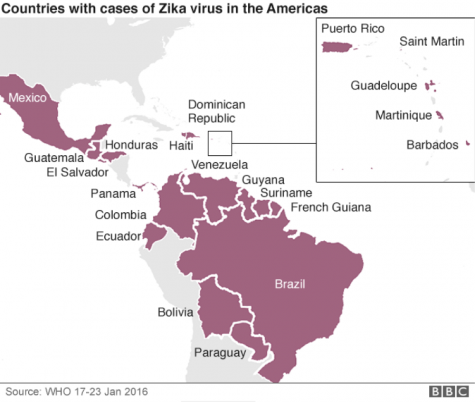Spring Break Epidemic
Zika Virus Looms In Spring-Break Hotspots
As spring break quickly approaches, students and families may want to avoid traveling to destinations in South and Central America, Mexico or the Caribbean.
A lot of families are hesitant to travel as the Zika virus continues to spread throughout the Caribbean, including Mexico, Puerto Rico and the U.S. Virgin Islands, the Dominican Republic and Jamaica – all popular spring break destinations for families and students.
According to the Centers for Disease Control and Prevention, only one in five people infected with Zika will get sick through the bite of an infected Aedes species mosquito. Those who have gotten sick so far in the U.S. were infected outside the country, though new reports are showing that the virus can also be spread through contact.
As we all know, the Zika virus has been linked to devastating birth defects of the brain called microcephaly. The CDC recommends that you postpone travel to any area where Zika virus transmission is ongoing if you are pregnant or trying to get pregnant. But does that mean it’s safe for children?
“We’re not cancelling spring break,” said CDC principal deputy Dr. Anne Schuchat during a White House press briefing on February 2. However, she did caution, “We are telling people who are pregnant that you may not want to go.”
If you must travel to Zika-infected regions, the CDC warns that you at least take precautions against mosquito bites. Many colleges throughout the country have made announcements regarding the Zika virus and student travel abroad, including the University of Virginia and George Mason University. In GMU’s health advisory notice, students are advised to “choose an EPA-registered insect repellent and use according to the product label.” Repellents should be used during both day and night since mosquito species that transmit Zika virus are daytime biters that will also enter buildings and bite at night. The school also advises students to “use permethrin-treated clothing, cover exposed skin by wearing long sleeves, long pants, and hats, and sleep indoors in rooms with screened windows or air-conditioning.”
Although Zika is not being actively transmitted in the U.S., travelers have brought the virus back with them. As the temperatures rise in the summer, the U.S. will be at greater risk of transmission from mosquitoes, especially in the Southern states, including Virginia.
The CDC has issued a Level 2 travel alert, meaning travelers should “practice enhanced precautions” in countries affected. It’s important to remember that the consequences of travel to areas that are highly affected with Zika virus could affect the larger community by spreading the virus.
Despite the warnings from the CDC, some students planning to travel to infected areas have expressed their skepticism. Since Zika virus warnings focus on women who are planning to become pregnant, men do not feel it necessarily applies to them.
Nonetheless, common symptoms include fever, rash, joint pain and conjunctivitis or red eyes. The illness is fairly mild, with symptoms lasting several days to a week, but there is no known vaccine to prevent it or medicine to treat it. Zika is a little-known virus that has been around for decades in Africa and the Asia-Pacific region before making its way to Latin America, where it has spread to over 20 countries. A half-million infections have been reported in Brazil since the outbreak began in spring of last year. “Due to the magnitude of the outbreak, Brazil ceased counting cases of Zika virus,” the WHO said in its first report on the virus. With the first case of sexual transmission confirmed in the U.S. last week, the White House announced on February 8 that President Obama will request $1.8 billion in emergency funding to fight Zika at home and abroad, saying the virus’ threat requires a double-barreled approach to limit mosquito populations while creating a vaccine.
Junior Alisha Bajaj expressed her safety concerns about having fun south of the border this spring break, saying, “I would not feel safe traveling to the Caribbean next month because I don’t want to take any chances of contracting the Zika virus.”
On the other hand, Junior Katherine Quion feels differently. “I would feel safe traveling there because the virus self-resolves within a few days or a week,” she said. “But I would opt to not go just to avoid contracting the rash and fever. And I would make sure to apply tons of mosquito repellent!”
With Spring Break scheduled for March 21-25, students should be aware of the risks of traveling to popular destinations this year. Remember, it’s better to be safe than sorry.


